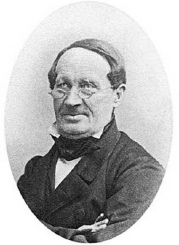Karl Ernst Claus
| Karl Claus | |
|---|---|
 |
|
| Born |
23 January 1796 Dorpat (now Tartu), Livonia, Russian Empire |
| Died | 24 March 1864 (aged 68) Tartu |
| Citizenship | Russian |
| Nationality | Baltic German |
| Fields | Chemistry, pharmacy, botany |
| Institutions |
University of Tartu, Kazan State University |
| Alma mater | University of Tartu |
| Known for | Discovery of ruthenium |
| Notable awards | Demidov Prize |
Karl Ernst Claus (also Karl Klaus or Carl Claus, Russian: Карл Ка́рлович Кла́ус, 23 January 1796 – 24 March 1864) was a Baltic German chemist and naturalist. Claus was a professor at Kazan State University and a member of the Russian Academy of Sciences. He was primarily known as a chemist and discoverer of the chemical element ruthenium, but also as one of the first scientists who applied quantitative methods in botany.
Karl Claus was born in 1796 in Dorpat (Tartu), Livonia, Russia, as the son of a painter. At the age of four, he lost his father and two years later became an orphan. In 1810, he moved to Saint Petersburg and started working as an assistant in a pharmacy. Although he had not received formal education, at age 21, Claus managed to pass the State exam on the pharmacist at the Military Medical Academy of St. Petersburg, becoming the youngest pharmacist in Russia at that time. Later in 1826, he established his own pharmacy in Kazan.
In 1821, Claus married Ernestine Bate whom he knew since his youth. They had three daughters born in Kazan and later a son, when they moved back to Tartu.
In 1827, Claus became involved, as an assistant of Eduard Friedrich Eversmann, in the botanical research of the steppes of the rivers Ural and Volga. He later used the collected data in his work "Flora der Wolgagegenden" (Flora of the Volga Region).
In 1834, while still studying at the University of Tartu, Claus went into another botanic trip to the trans-Volga steppes – this time with chemistry professor Gebel. The results of this expeditions were published in 1837–1838.
...
Wikipedia
